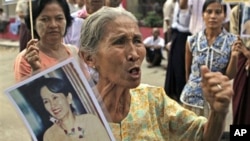Burma and the world are waiting to see if the military government will release pro-democracy icon and Nobel Peace Laureate Aung San Suu Kyi from house arrest as reported.
She has been in some form of detention for most of the past 20 years. And on Saturday, her latest term of house arrest is scheduled to expire. Aung San Suu Kyi was convicted last year of violating the terms of an earlier house arrest order when she gave shelter to an American man who swam uninvited to her lakeside Rangoon home.
She was sentenced to three years of hard labor, but Burma's leader, General Than Shwe, commuted the sentence to an additional 18 months of house arrest. VOA Bangkok Correspondent Daniel Schearf has been following the story.
What are the possible scenarios if the government decides to free her from house arrest?
Her lawyer Nyan Win has said that she has made it clear that she wants to investigate some of the claims of voter fraud that the opposition parties have alleged from last Sunday's elections. She clearly is wanting to play a bit of a role in politics, although maybe not directly. Her party, the NLD, has been disbanded as a political party and is therefore not allowed to operate as a political party until it registers with the government. The NLD refused to register earlier this year because of unfair election rules. So it will be interesting to see the government's reaction if she is released and if she does try to get involved in politics or at least bringing attention to these political issues.
Why would the government agree to release her if she is inclined to return to politics?
That's the big question. Do they really plan to release her at all? And if they do release her, how long will it be for and will they allow her to have freedom of movement? Or will they try to limit where she can go? The last time they released her for any extended period of time, she tried to go around the country and motivate her supporters to push for democracy. They were essentially attacked by a group that was supporting the military government and that led to her being put under house arrest for the umpteenth time. So there are concerns about her security and there are concerns about the government motivation behind her release.
You have just returned from a trip to Mae Sot, Thailand, where Burmese refugees have fled recent fighting between the Burmese military and ethnic Karen rebels. How much popular support is there for Aung San Suu Kyi?
The impression I get from talking to people coming from Burma and from talking to people in the Burmese exile community in Thailand is that Aung San Suu Kyi is still very much respected among the people, and is seen as one of the only hopes for democracy in a country that has been ruled by the military for more than 50 years. So she has their respect, she has their admiration, and it will be interesting to see if the military allows her to go out to talk to people because she can command quite an audience. She can motivate people to get involved whereas the military does not want to see that happen. What constraints she is put under, the limitations on her movement or ability to hold public gatherings, will indicate what sort of threat the military sees from Aung San Suu Kyi.




